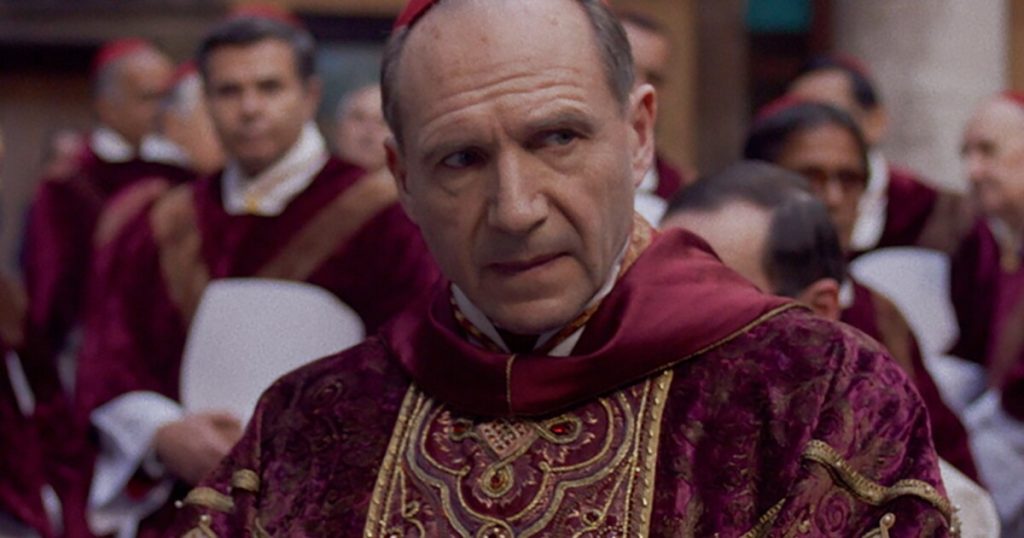
The upcoming thriller Conclave, based on Robert Harris’s bestselling novel, delves into the intricate and often secretive world of papal elections. Directed by Edward Berger, known for the Oscar-winning All Quiet on the Western Front (2022), the film combines elements of a political thriller with the rich traditions of the Vatican. It explores the schemes, rivalries, and power plays that unfold as cardinals vie for the papacy.
In a pivotal scene, U.S. Cardinal Bellini, portrayed by Stanley Tucci, faces a moral dilemma when considering whether to use stolen documents to tarnish a rival’s reputation. “I’d be the Richard Nixon of popes,” he quips, illustrating the film’s sharp wit and engaging narrative. Conclave provides a contemporary lens on the ancient ritual of electing a new pope, vividly capturing the tension between age-old traditions and modern media dynamics.
Robert Harris, who conceived the story during the 2013 election of Pope Francis, reflects on the inspiration behind the novel. As he watched the cardinal electors gather, he noted their diverse expressions—some benign, others cynical. “Oh my God, I’m looking at the Roman Senate,” he thought, drawing parallels between the current papal process and the historical power struggles of ancient Rome. His research into conclaves revealed a gripping world of raw politics, which became the foundation for his novel.
Ralph Fiennes takes center stage as Cardinal Lawrence, a principled English cleric grappling with his faith and responsibilities. Following the death of the pope, Lawrence is tasked with overseeing the conclave. The film authentically depicts the cardinals’ seclusion in Casa Santa Marta, where they surrender their phones and live under strict confidentiality while voting in the Sistine Chapel. Though the actual locations were recreated in Rome’s Cinecitta Studios, the filmmakers’ dedication to accuracy is evident.
Despite the film’s historical details, the narrative revolves around human ambition and political maneuvering. Berger emphasizes that the cardinals’ aspirations mirror those found in any institution: “When the CEO is gone, people will come out fighting.” This duality presents the cardinals as both holy figures and individuals with relatable flaws and vices.
Harris aims to highlight the genuine divisions within the Church, reflecting the polarized nature of contemporary politics. The film introduces starkly contrasting characters, such as the liberal Bellini and the conservative Cardinal Tedesco, played by Sergio Castellitto. Other key players include Canadian Cardinal Tremblay, who represents a progressive vision, and Adeyemi, an African candidate with aspirations of becoming the first pope from the continent. This diversity adds depth to the political landscape of the conclave, with alliances forming and breaking amid the pressure of the election.

As the cardinals strategize, the specter of media scrutiny looms large. In one scene, a rival reveals damaging information about a cardinal, prompting the somber warning that “you will never be Pope.” This echoes real-life concerns regarding scandals that have plagued the Church, highlighting the pervasive influence of public perception.
Historically, papal elections have been fraught with intrigue, as evidenced by past scandals involving bribery and manipulation. Harris’s narrative connects these historical threads to modern-day media, illustrating how the fervor surrounding a conclave often mirrors a circus-like atmosphere. The film’s portrayal of cardinals maneuvering in public and private spaces further emphasizes this tension, as they navigate both personal ambition and the weight of tradition.
At the heart of Conclave is Cardinal Lawrence’s internal struggle. As he grapples with a crisis of faith, his character becomes a relatable figure for audiences. Berger notes that while the film revolves around the election, it also explores deeper existential themes. “It could just as easily be about inner confidence,” he explains, inviting viewers to reflect on their own challenges.
A subtle yet impactful element in the film is Isabella Rossellini’s role as Sister Agnes, who oversees the nuns serving the cardinals. Although meant to be background figures, Agnes’s character challenges the patriarchal structure of the Church. “God has given us eyes and ears,” she declares, embodying a voice of insight that disrupts the status quo.
The film builds to a shocking conclusion that intertwines with its core themes. Harris emphasizes that the ending is not merely a twist but integral to the narrative. The insights he received from Cardinal Cormac Murphy-O’Connor, who endorsed the authenticity of the portrayal, lend further credibility to the film’s depiction of the conclave.
As Conclave prepares for its release, it promises to engage viewers not just with its thrilling plot but also with the complex human emotions and political realities underlying one of the most secretive processes in the world. The film stands as a reflection of our contemporary landscape, where ambition, morality, and faith collide in unexpected ways.







